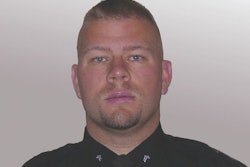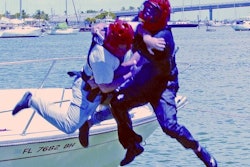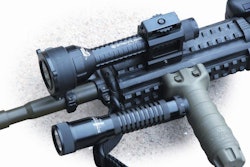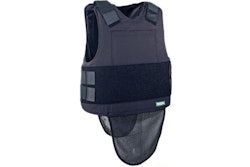New York State Troopers Shawn Dean and John Spero had been parked at the side of the highway, driver’s window-to-driver’s window, comparing notes and spooking speeders into slowing down. Dean was content with the notion that everyone was pretty much adhering to the speed limit, if only for the moment. At six o’clock p.m., it was the mid-point of his shift, and Spero’s stint was almost over.
As they pulled onto State Route 11, a 1995 Dodge Spirit passed by. The significance of the orange color of the inspection sticker in the Dodge’s windshield was not lost on either of the young officers: It was five months out of date. Spero already had his fair share of cites under his belt, so Dean figured this one was his.
He pulled onto the roadway to follow the Dodge. As he did, gray smoke began emanating from the area of his patrol car’s steering column.
Great, he thought. My car’s on fire.
Give chase or give up? Dean decided to make what use he could of the Crown Vic while he still had mobility. He keyed the radio to get Spero rolling his way, just in case.
Despite his smoky compartment, Dean caught up to the Dodge and lit it up as Spero zipped in and out of traffic to catch up. Eventually, both troopers found themselves following the vehicle off the highway.
The car seemed to be in no rush to pull over. Dean gave his siren a perfunctory whelp and the Dodge finally yielded, pulling to the curb on a residential side street.
Making the Stop
Both state patrol cars pulled up offset and to the rear of the Dodge and parked. Dean approached the driver’s side of the car on foot, while Spero wasted no time in getting up to the passenger side to glance inside for telltale signs of danger. There were two men in the front seats.
Nearing the open driver’s window, Dean performed his usual visual sweep of the car’s interior and its occupants for any red flags. Something about the car’s odorless cleanliness suggested an elderly owner, but other than that, nothing stood out. Casting a quick glance over the hood of the car at Spero, Dean adopted a quizzical expression and pointed two fingers at his own eyes: See anything? Spero shook his head no.
Dean turned his attentions back to the driver. In response, the man’s shaking hand surrendered a Pennsylvania driver’s license in the name of Michael J. Fisher. Dean looked the man over. Fisher was wearing sweatpants, a flannel shirt, and his hair was short-cropped, almost clean-cut.
But something about the car’s condition and the USMC sticker in its rear window didn’t mesh with its jittery driver.
Dean asked for the hard copy of the car’s registration.
“Don’t have it. It’s my grandmother’s car,” Fisher said.
That would explain the condition of the car’s interior, Dean thought.
The explanation of the car’s condition and the identity of its true owner would have lessened some of Dean’s own anxieties were it not for Fisher’s manic drags on his cigarette. Dean asked Fisher where he and his passenger were coming from. Fisher said that they’d just left a nearby mall.
At the time, Dean was in the habit of maintaining a staccato rapid-fire barrage of questions designed to keep suspects from having the requisite time to fabricate some BS story. Most of the time, this tactic achieved the desired results. Fisher was proving to be no exception. His story wasn’t making much sense.
The area in which Dean and Spero worked—Binghamton—was right on the Pennsylvania border. Another four miles in a straight line and their two detainees would have made it. But around the time that Dean had pulled behind the Dodge, it’d started for the side streets. He called Fisher on it.
“Yeah…,” Fisher hemmed. “Well…we’re just taking this back route.”
Dean could think of no reason someone would do that. Unless it was to avoid a patrol car.
Fisher’s passenger, Wayne P. Rafferty, was equally nervous. The two fingers cradling his own cigarette were vibrating with such seismic intensity that Spero could barely contain a laugh. When asked about the shakes, Rafferty explained that he had Tourette’s. Spero asked him what he was taking for it. “Aspirin,” Rafferty said, straight-faced.
Right, thought Spero.
Comparing Notes
By silent accord, the two troopers moved to the trunk of the car, where they compared notes.
Independent of one another, both of the car’s occupants had said they’d just left the mall. But it was only on this singular point that the two men’s stories matched up. Their destinations, mutual friends, knowledge of one another, and everything else varied.
The officers switched places, then they spent another minute speaking with the two before reconvening at the trunk and agreeing that something definitely wasn’t kosher. It was time to get the occupants out of the vehicle.
Spero started with the passenger, having him step outside the car while Dean kept vigil from the front of his patrol car. Once the two were safely out of the car and patted down, Dean would run them for wants and warrants.
His patdown search of the compliant Rafferty was just about done when Spero heard the distinctive sound he recognized as the grating squeak of the driver’s door creaking open. Immediately, he knew something was wrong. Dean simply wouldn’t have gotten the man out until he’d finished with the passenger, nor would he have allowed the driver to get out of the car on his own. As Spero reflexively reached for his holster and broke leather, he looked up and to his left, his eyes confirming his greatest fear.
Centerpunched
The driver was leveling a .38 caliber revolver at him.
“Put your f___ing hands up!” Fisher yelled. “Don’t f___ing move!”
Spero couldn’t do that if he wanted to. Training and conditioning had taken over. Fisher may have had the drop on him, but Spero was committed to doing what was necessary to stay alive, and the man’s obscene commands bought him perhaps a split second of time. He took advantage of it, bringing his sidearm up to eye level and firing two rounds at the driver.
The driver also fired. A single round from his gun centerpunched Spero’s two-fisted grip, shattering the bones of the officer’s fingers and the magazine well of his department issue sidearm.
Spero’s upper torso curled in on itself and he fell.
The door’s squeak was the first thing Dean heard, and the revolver was the first thing he saw.
The gun came out low at Fisher’s right side, before being suddenly elevated in the gangsta grip, palm pointed to the ground, barrel canted at a 90-degree angle. Then came the epithets, followed by a burst of gunfire and Spero fell.
Dean’s response was immediate. He moved toward the shooter, determined to take him out.
At the sight of Dean’s approach, Fisher—who’d continued to track Spero with his gun—started to run.
Whether or not Fisher was angling for cover Dean didn’t know. And he didn’t care. He needed to put the S.O.B. down. Dean fired on the move.
But his shots weren’t finding their target. Dean had just shot a 247 of 250 on the range two weeks prior. He knew he was a good shot. But now his rounds seemed to be missing the suspect. Had he suddenly lost the ability to shoot when he most desperately needed to shoot well?
Suddenly, Fisher took a tumble, face-first, skidding across the asphalt and coming to rest on the opposite side of the street.
The sustained volley of shots was the first thing Spero heard after he hit the ground. His own gun destroyed, he realized the rounds he was hearing were now being fired by Dean, positioned at the left front of the radio car.
Spero looked to the side. The space between the undercarriage of the Dodge and the asphalt afforded him a clear view of the street. He saw that the driver’s body was now face down in the street.
A wave of momentary relief washed over Spero. But he’d been hit, and he didn’t know where, or how badly. He could taste the salt of his own blood on his lips, his hands throbbed as adrenaline coursed through his system, and the blood vessels in his eyes constricted, giving him tunnel vision.
Spero knew he needed medical attention, and he didn’t trust his portable radio. He jumped up and ran toward the front door of a nearby residence. He kicked at the door, yelling for somebody to call 9-1-1 and advise the operator that there had been an officer-involved shooting.
The Body
Dean closed the distance between himself and the prostrate Fisher. The man had taken rounds to the front and side of his torso. Spero’s two rounds had found their mark. Dean had also scored hits on the would-be cop killer as he tried to run away.
Spinal fluid oozed from Fisher’s ears, and his mouth moved in silent spasms. Still covering Fisher with his sidearm, Dean toed the man’s body over. Dead eyes stared blankly at a cloudy sky as rain began to fall.
An off-duty Binghamton police officer, John Carpenter, who lived nearby, came to assist. To make Carpenter identifiable as a “friendly” to responding officers, Dean tossed him his uniform hat before going off to find Spero and check on his condition.
Paramedics arrived shortly thereafter to treat Spero and pronounce the suspect dead. Dean handcuffed Rafferty, who had stayed put throughout the shooting, and had Carpenter sit on him until backup arrived.
The Car’s Secrets
In retrospect, Dean figures the incident revolved around vehicular deficiencies. The probable cause had been an out-of-date sticker on the suspect’s car. Then there was the smoking steering column of his patrol car. Dean believes that turned out to be a blessing in disguise. For without it, he probably wouldn’t have asked for Spero to roll, and he would have been the only officer on the scene. The final vehicular deficiency was the driver’s door on the Dodge. The squeaking door had dimed out Fisher’s intentions. Neither Spero nor Dean likes to contemplate how things might have played out if that door hadn’t squeaked.
Where Fisher retrieved his .38 caliber Colt Detective Special from is anyone’s guess. Dean and Spero surmise that it was either in his waistband or wedged between the driver’s door and seat.
What isn’t a mystery is why Fisher attacked Spero. A search of the Dodge, which was stolen, revealed that Fisher had been responsible for a series of burglaries. It also revealed a weapons cache. In the trunk, detectives found a Smith & Wesson .38 special, a Ruger Black Powder Revolver, and a Thompson Rifle with folding stock, all reported stolen.
Inside the passenger compartment area of the car, detectives recovered two ski masks from under the front seat, latex gloves and an empty black nylon holster on the driver’s seat, and a Bowie knife from under the arm rest.
Lessons Learned
Spero recuperated from his injuries and returned to full duty. Both officers received numerous awards, and Dean was also one of Parade magazine’s finalists for Officer of the Year honors. Dean transferred out of State Police Binghamton to State Police Endwell, on the same day that Spero returned to active duty in October 2002.
As a range instructor, Dean now encourages his fellow officers to practice firing 50 rounds at seven yards as quickly as possible.
“Think about it,” he says. “We practice all this static shooting at 25 yards all the time, when statistically it’s borne out that a vast majority of officer-involved shootings take place at much tighter distances. Firing all those rounds in rapid succession helps an officer get used to firing under stress conditions as quickly and as tightly as possible.”
In terms of traffic stop procedures, Dean says he’s abandoned the “riddle-me-this” 20-question approach to interrogating a vehicle’s occupants. These days, he’s straight to the point.
“Every time I go to a traffic stop now, the incident is always in the back of my mind,” Spero notes. “There’s never any complacency. I always unsnap my holster on approach, and place my hand on the car. I don’t care if it’s an old lady, or not. It’s not that I wasn’t vigilant before. It’s just that now I’m much more attuned to all that’s going on around me.”
Dean Scoville is a patrol supervisor with the Los Angeles Sheriff’s Department and a contributing editor to Police.


















